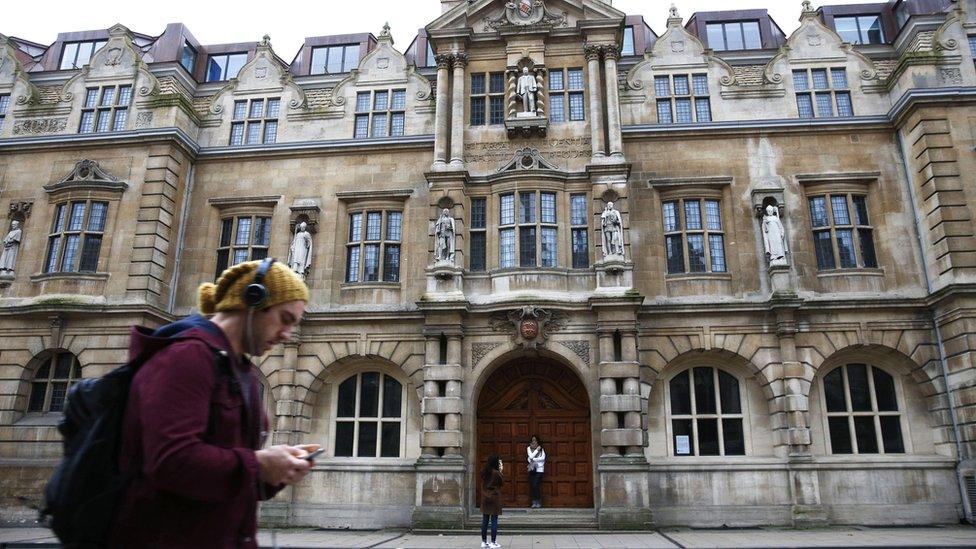Will 'Rhodes Must Fall' fail?
- Published

The Rhodes statue stands above two other figures over this Oxford college entrance
A statue of British colonialist Cecil Rhodes is upsetting students in Oxford. But the university's chancellor is adamant that it's staying.
Students returning to Oxford University after the Christmas break have been told their campaign "Rhodes Must Fall", aimed at toppling the famous statue, will fail.
The university's chancellor, Lord Patten, has stated publicly that it should remain. Similar views were also expressed by Professor Louise Richardson when she became the university's new vice chancellor this week.
But many students still can't get over the statue's presence and feel it's an uncomfortable reminder of the past.
"I feel the same way that I would feel if I saw a statue of Hitler in Germany," says Ntokozo Qwabe, a 24 year old South African student, and one of many campaigning for it to come down.
Back in Spring 2015, a related "Rhodes Must Fall" campaign in South Africa was spearheaded on Twitter, and resulted in the removal of another statue in Cape Town University. Qwabe is championing the same campaign in Oxford, hoping for a similar effect.
Rhodes was a revered figure in the days of the British Empire. But today many regard him as a British colonialist who benefited from Africa's resources at the expense of many South Africans. He also founded an eponymous country - Rhodesia - now Zimbabwe and Zambia.
Rhodes believed that the English were the master race, and was once quoted as saying: "I contend that we are the first race in the world and that the more of the world we inhabit, the better it is for the human race."
Educated at Oxford, Rhodes left a large sum of his fortune to the university to fund scholarships for students around the world to study there - hence the statue which adorns the front of Oriel College.
For Qwabe and those who support the movement, it's a permanent reminder of Britain's brutal colonial history.
Tadiwa Madenga is 22 years old and studying Women's Studies at Oxford University. She's from Zimbabwe and she says she's part of the first generation of her family to be born free. When she walks past the statue, it reminds her of her family who grew up in Rhodesia. "To me when I see this statue, it's not a far away memory," she said. "We've lived in places where we've seen the consequences and it still deeply affects us, this kind of memory of British imperialism."
Not all black students agree that the statue should come down. Dena Latif is 19 years old and from Sudan, she's studying at Oriel College.
"You can take down all the statues and portraits you want and there will still be the same racial imbalance that there is today. Cecil Rhodes did go to this college, he did contribute a lot of money, we can't pretend he wasn't here."
One white student sighed when asked for his views and said it was a really divisive issue that everyone in the common room was talking about: "The issue is, removing it looks so reactionary, in doing that it's like you've solved the issue - it's tokenistic."
Oriel College haven't completely ignored the Rhodes Must Fall Oxford movement. A plaque which was also commemorating Rhodes on the University grounds has been removed.
A sign has also gone up in the window below the statue which reads: "In acknowledging the historical fact of Rhodes' bequest, the college does not in any way condone or glorify his views or actions."
The college is also organising a six-month "listening project" starting next month, but the students we spoke to felt it was too little, too late, pointing out that in six months time they will have graduated.
Speaking on the BBC's Today programme, Lord Patten explained why he thinks the statue should remain.

Follow BBC Trending on Facebook
Join the conversation on this and other stories here, external.

"What do you do about our history? Any views Cecil Rhodes had about empire were common to his time. What Rhodes did at the end of his life was give money to help ensure others get this opportunity."
Lord Patten is referring to the Rhodes Scholarship, which pays for dozens of students from around the world to attend Oxford. He also said those uncomfortable should "think about being educated elsewhere."
In response to the interview Ntokozo and Madenga told BBC Trending: "Lord Patten talks about being open minded but he is unwilling to be open minded about engaging with the ways that Oxford might be institutionally racist. Instead he is implying that we must leave if we don't agree with Western understanding of history and there is nothing open minded about that."
But Qwabe is a recipient of the Rhodes scholarship and has been on the receiving end of criticism because of this. He's been called a hypocrite and some on social media have called for him to "give the money back."
Qwabe has responded to this criticism by arguing that it was never Rhodes' money to give in the first place. It was wealth forcibly taken from African resources - from his own ancestors - he says.
Madenga, one of the Rhodes Must Fall campaigners, told BBC Trending that even though Rhodes died over 100 years ago, the impact of his racist attitudes are still felt today. She talked about Dylann Roof who is accused of killing nine people at a church in South Carolina in 2015.
"He had written a manifesto called The Last Rhodesian. He had the Rhodesian flag stitched on to his jacket. After that, people took very seriously the idea of the confederate flag and taking it down. A lot of people at Oxford think the confederate flag is racist, well, so is Rhodes."
Next story: Twitter campaign to get all France wearing Jewish skullcaps

To publicise the protest campaigners mocked up a Babybel cheese as 'Rabbibel'
French people of all backgrounds are being urged to wear Jewish skullcaps as part of campaign against anti-Semitism. READ MORE
You can follow BBC Trending on Twitter @BBCtrending, external, and find us on Facebook, external. All our stories are at bbc.com/trending.